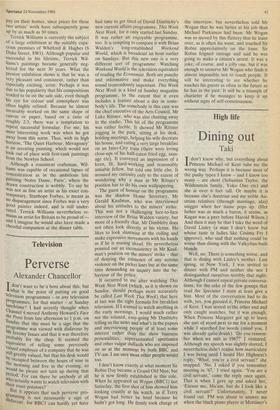Television
Perverse
Alexander Chancellor
Idon't want to be a bore about this, but What is the point of putting on good television programmes – or any television Pflpgrammes, for that matter – at Sunday lunchtime? I had secretly thought when Channel 4 moved Anthony Howard's Face the Press from late afternoon to 1 p.m. on Sunday that this must be a sign that the programme was viewed with disfavour by Mr Jeremy Isaacs and that it was therefore Probably for the chop. It seemed the equivalent of telling some previously valued employee of a company that he was still greatly valued, but that his desk would be occupied between the hours of nine in the morning and five in the evening, so Would he please not turn up during that Period. For can there be anybody at all Who actually wants to watch television with their roast potatoes? But it appears that such perverse pro- .,iramming is not necessarily a sign of disfavour for BBC1 can hardly yet have had time to get tired of David Dimbleby's new current affairs programme, This Week Next Week, for it only started last Sunday. It was rather an enjoyable programme, too. It is tempting to compare it with Brian Walden's long-established Weekend World, which is broadcast an hour earlier on Sundays. But this new one is a very different sort of programme. Watching Weekend World is the television equivalent of reading the Economist. Both are punchy and informative and make everything sound tremendously important. This Week Next Week is a kind of Sunday magazine programme, to the extent that it even includes a feature about a day in some- body's life. The somebody in this case was the chief executive of the Arts Council, Mr Luke Rittner, who was also chatting away in the studio. This bit of the programme was rather feeble. It showed Mr Rittner jogging in the park, sitting at his desk, holding meetings, helping his wife decorate his house, and eating a very large breakfast on an Inter-City train (there were loving close-ups of his half-eaten fried egg, saus- age etc). It conveyed an impression of a keen, fit, hard-working and reasonably amiable fellow, but told one little else. It aroused my curiosity only to the extent of wondering why a man in Mr Rittner's position has to do his own wallpapering. The guest of honour on the programme was the shadow Home Secretary, Mr Gerald Kaufman, who was interviewed about his attitudes to the miners' strike. This was not a challenging face-to-face interview of the Brian Walden variety, but more of a friendly chat. Mr Dimbleby does not often look directly at his victim. He likes to look slantwise at the ceiling and make expressive movements with his hands as if he is musing aloud. He nevertheless pointed out an inconsistency in Mr Kauf- man's position on the miners' strike – that of denying the existence of any serious violence on the picket lines but at the same time demanding an inquiry into the be- haviour of the police. It occurred to me after watching This Week Next Week (which, as it is shown on Sunday, should perhaps more accurately be called Last Week This Week) that here at last was the right formula for breakfast television. If! wanted to watch anything in the early mornings, I would much rather see the relaxed, easy-going Mr Dimbleby telling us the news and what's in the papers and interviewing people of at least some interest rather than the show business personalities, superannuated sportsmen and other vulgar dullards who are imposed on us at the moment by both BBC and TV-am. I am sure most other people would too. I don't know exactly at what moment Sir Robin Day became a Grand Old Man, but he is now firmly established in this role. When he appeared on Wogan (BBC1) last Saturday, the first shot of him showed him looking crustily at his watch, as if Terry Wogan had better be brief because he hadn't got long. He firmly took charge of the interview, but nevertheless told Mr Wogan that he was better at his job than Michael Parkinson had been. Mr Wogan was so moved by this flattery that he leant over, as is often his wont, and touched Sir Robin appreciatively on the knee. Sir Robin feigned outrage and said he was going to make a citizen's arrest. It was a joke, of course, and a jolly one, but it was enough to unnerve Mr Wogan who finds it almost impossible not to touch people. It will be interesting to see whether he touches his guests as often in the future as he has in the past. It will be a triumph of character if he manages to keep it up without signs of self-consciousness.






















































 Previous page
Previous page